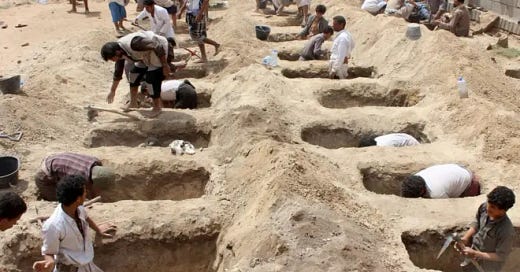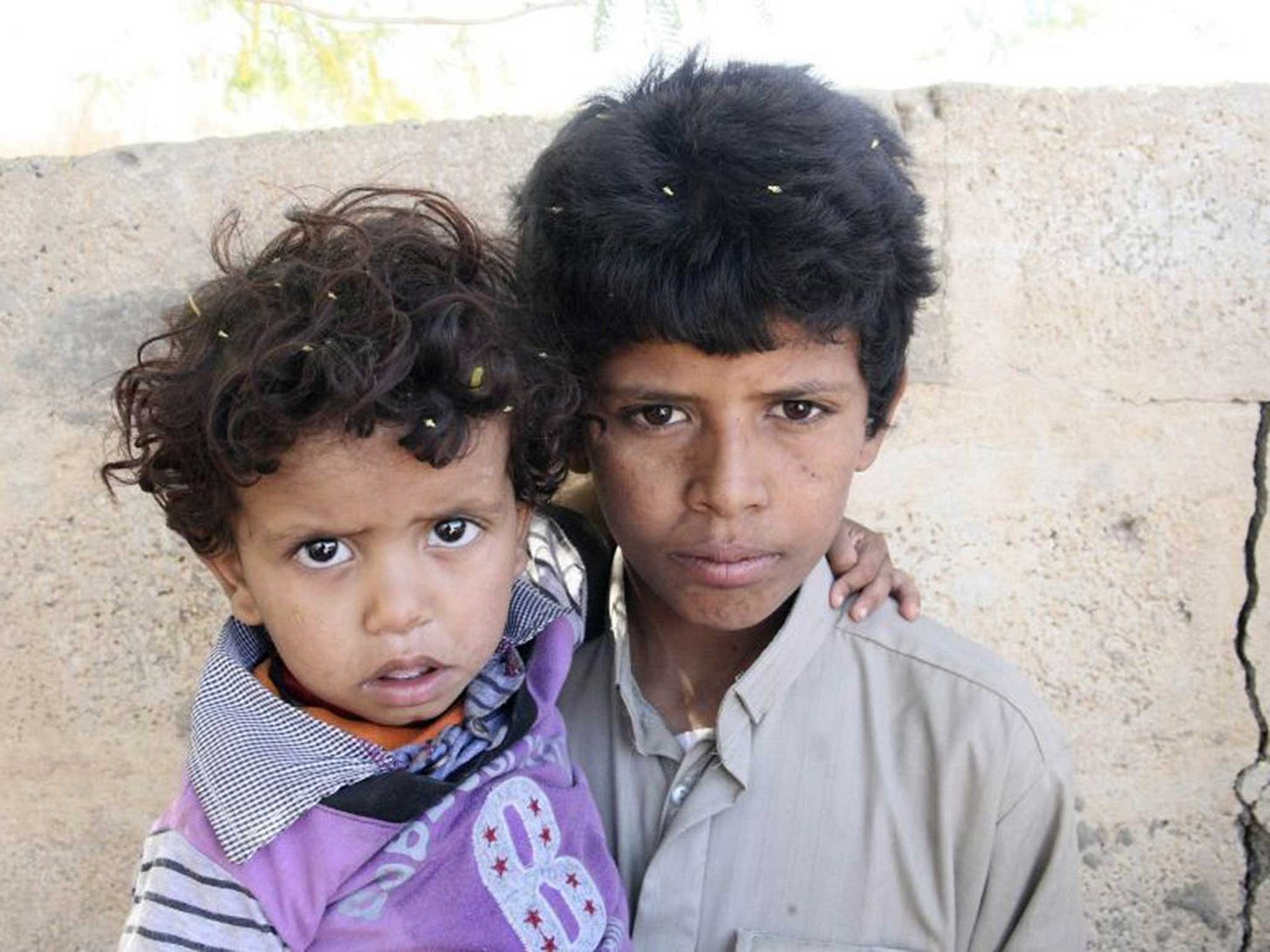Editor of The Atlantic Jeffrey Goldberg1 recently showed that the Trump administration is conducting the war on Yemen in an extremely incompetent way. Unsurprisingly, the insane clown posse that rules America is acting like a posse of insane clowns.
What’s equally unsurprising, and infinitely more disturbing, is the lack of regard in mainstream discourse for the Yemeni civilians, including four children, who were just killed by America (the recent strikes hit mostly civilian targets, including a school and a medical centre). On Friday, Goldberg had a half-hour conversation with Anne Applebaum (another titan of the American foreign policy establishment) all about the Signal group chat debacle at the New Orleans Book Festival. Not once did they mention the victims of the American attack. Not once did they mention that the attack was illegal under American law (it had not been approved by Congress). Not once did they mention the war America has been conducting in Yemen for more than a decade, nor did they mention its victims (who number in the hundreds of thousands). They did, however, get many laughs, explain that authoritarianism is bad, and tell the audience to read The Atlantic.2
While the Signal group chat fiasco is concerning, it’s just the tip of a massive, sickening, heinous iceberg of murder. Ignoring that aspect of the story is scandalous. The real crime is the American war on Yemen, which has continually violated basic principles of morality, Constitutionality, and international law.
America’s Illegal War
“All members shall refrain in their international relations from the threat or use of force against the territorial integrity or political independence of any state, or in any other manner inconsistent with the Purposes of the United Nations.”
That’s what the UN Charter, the basis of international law, says. (There are three exceptions: use of force is OK if it is in self-defence under Article 51, authorized by the UN Security Council, or consented to by the host state.) The United States has routinely ignored this prohibition against use of force, conducting illegal wars across the globe and undermining the international rules-based order, including in Yemen.
America has been at war in Yemen for a long time (without Congressional approval). Since 2009, the US has conducted anti-terrorism operations in the country. US-backed Yemeni president Saleh (1990-2012), who ruled with an iron fist and brutally suppressed protests by force, seemingly approved of America’s military interventions in his country, meaning they were not in violation of the UN Charter’s prohibition of use of force. However, the attacks frequently violated the laws of war. Groups such as Airwars and Human Rights Watch have meticulously analyzed US attacks in Yemen during this period and found that these attacks routinely targeted civilians and civilian infrastructure. For example, a strike on the village of Al-Majalah (December 17, 2009) used cluster munitions and killed at least 41 local civilians, including 9 women and 21 children.
After a revolution ousted president Saleh, his vice president, Abrdabbuh Mansur Hadi (2012-2017) took power. He spoke approvingly of the US’s military operations in his country. The US’s anti-terrorism operations between 2012 to 2015 were similarly conducted with little respect for international humanitarian law. Notably, the US mistakenly bombed a wedding convoy. On another occasion, America killed 13-year-old Mohammed Tuaiman. Months earlier, Tuaiman had been interviewed by The Guardian after America killed his father and brother. In the interview, Tuaiman had said he lived in constant fear of “death machines” in the sky.
In 2014, there was a popular revolution led by the Houthis against the Hadi government. The Houthi insurgency took the capital, Sanaa. Saudi Arabia intervened on Hadi’s behalf, and the US backed Saudi Arabia. This began Saudi Arabia’s devastating war on Yemen, which included over 25,000 air raids. As early as 2016, the United States government was aware that it was likely implicating itself in further war crimes by backing Saudi Arabia’s indiscriminate bombing campaign. (The US and Saudi bombing campaign of Yemen has been compared to Russia’s war on Ukraine even by such hawkish outlets as the Washington Post.) The US continued its attacks in Yemen (without Congressional approval) with the support of the internationally recognized Yemeni government led by Hadi.
In February 2017, the Yemeni government rescinded its authorization for US ground operations in the country after the Yakla raid, which killed scores of civilians, including many children under the age of 13, one 3-month-old baby, and a pregnant woman. This meant the further ground operations in the country that were not explicitly sanctioned by the Yemeni government would be violations of the UN Charter, unless in response to a Yemeni attack on the United States. Despite this, the United States conducted a ground operation in May of 2017 in Marib (without Congressional approval), which killed many civilians, according to multiple investigations.
Had these villagers in Marib recently conducted an “armed attack” against the United States that would justify use of force as self-defence under Article 51 of the UN Charter? No. And outside armed conflict, the use of force is only allowed if it is “strictly unavoidable” in order to defend against an “imminent threat of death,” according to international humanitarian law.
Further, the United States did not report this attack to the UNSC by filing an Article 51 letter (which is required), whereas the US had filed Article 51 letters to justify other uses of force which were supposedly done in self-defence, such as in 2014 in Syria.
Rather, it seems that the Marib attack was one of many conducted by America in Yemen (and in the War on Terror more broadly) which was not in response to a direct attack on the United States and which ignored the principles of sovereignty and proportionality under international law. The US has relied on a dubious and broad interpretation of self-defence, eroding Article 51, to justify attacking countries across the globe (without Congressional approval) in pursuit of terrorists. Those bombings often are disproportionate, killing many civilians, and astute observers might realize that killing millions of civilians helps make more terrorists! Empirical analysis has shown that terror activity increases significantly in countries that the US bombs or invades, and there’s a temporal lag: the terrorism follows, and does not precede, the intervention.
In November of 2017, America’s Saudi allies put Yemeni president Hadi under house arrest, effectively overthrowing the internationally recognized Yemeni regime (though there wasn’t much of a governance structure to inherit). From this point onward, we can safely assume that neither the Saudis nor the Americans had the permission of the Yemeni government to go to war in Yemen, because consent for war cannot be given under duress, meaning that further attacks were in violation of the UN Charter.
The war in Yemen shifted when the Houthis began attacking civilian ships in response to Israel’s devastation of Gaza. Biden went to war over this, and Trump has recently escalated the conflict (all of this without Congressional approval). The Houthis had stopped attacking ships following the Israel-Hamas ceasefire. Israel broke the ceasefire, the Houthis said they would start attacking again, America bombed Yemen, and then Houthis resumed attacks. Multiple scholars have disputed America’s and Britain’s claims of self-defence under Article 51 (which has stringent criteria) regarding Houthi attacks.
These attacks will not deter the famously un-deterable Houthis. Biden’s attacks on them never did, and the Houthis emerged even stronger after a seven-year airwar on them by the Saudis. Enforcing the Israel-Hamas ceasefire is the only way to stop the Houthi attacks (barring a Vietnam-esque war in Yemen).
But deterrance is not the main point. The Signal chat revealed that America is bombing Yemen to “send a message” and “not look indecisive.” As
wrote:Whether you think it’s the right decision or not to bomb Yemen and blow the limbs off dozens of innocent people, the decision to do so ought not to be taken lightly or without robust public debate. There are conditions under which it is appropriate to kill civilians, even for economic ends like protecting shipping. But it is not appropriate to kill civilians without a good reason, or to engage in military action when you haven’t methodically considered the risks and costs of intervention or the possibility that it won’t achieve its goals.
The war in Yemen has claimed at least 377,000 lives, the majority of which were lost due the blockade imposed on Yemen by America’s ally, Saudi Arabia. This has contributed to the famine in Yemen, which, as of a year ago, has placed 17.3 million Yemenis in acute food insecurity. The US and Saudi war in and blockade of Yemen also caused a cholera epidemic with at least 2.5 million cases. At one point, the epidemic was infecting one child every minute.
The American war in Yemen from 2009 to 2017 was conducted with little respect for the laws of war, as I documented above. From 2017 to 2023, the American war was clearly in violation of the UN Charter (and given America’s shaky interpretation of self-defence under Article 51, the ongoing war is probably also illegal under international law). Yemen has not given the US permission to attack it, and the UN Security Council has not authorized the war.
And obviously, as I noted above many times, the war in Yemen is illegal under domestic US law. Congress has not given permission to the president to go to war, which is required by the Constitution. Obama, Trump, and Biden are criminals.
(Who notably falsely reported that al-Qaeda was linked to Saddam Hussein in the build-up to the Iraq War)
If you do read The Atlantic, I encourage you to diversify your media diet by also reading some non-hawkish magazines like Harper’s, Reason, Compact, Responsible Statecraft, and The American Conservative.







Not only are they acting without congressional approval, but using third party, unofficial, non-auditable methods to communicate - meaning there are many more actions being taken that we may never be able to find out, investigate, or hold accountable.